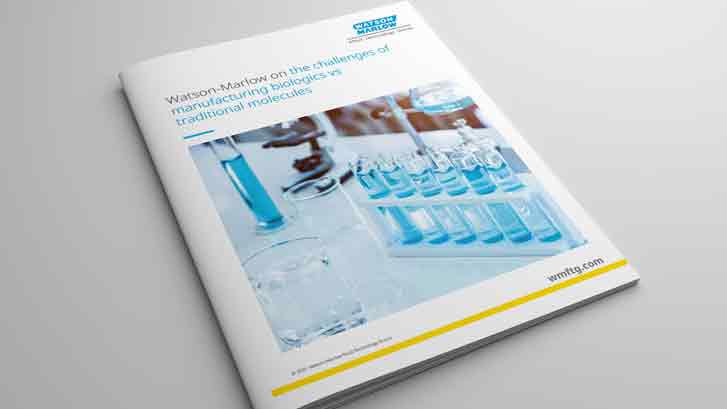- Insight
- Biologics bring the hope of a cure for some of the most prevalent diseases
- Challenges remain in reducing the enormous costs and simplifying the intensive and complex production process
- A new article sheds light on how the bioprocessing industry can help accelerate biologics production
The biologics manufacturing industry has seen rapid growth in recent years, but challenges remain to reap the rewards that biologics offer. Bioprocessing expert, Jim Sanford, shares his insights in a new article on how the industry may increase capacity, intensify processes, regulate equipment and procedures, and enhance product integrity to reduce bottlenecks and accelerate biologics production.
The new article was launched today by a global leader in fluid management technology, Watson-Marlow Fluid Technology Group (WMFTG), and is now available to download.
With life expectancies rising globally, the prevalence of chronic diseases is also increasing, especially in emerging markets like Asia-Pacific and Latin America. This is driving the growth of the biologics market. Critical players are already investing in these emerging markets but further investment is needed in Asia-Pacific, Latin America, Africa, South America, Eastern Europe and Russia.
Biosimilars are becoming more prominent, rising to meet the growing demands of these developing nations. Several established monoclonal antibodies and other biologics are approaching the end of their patents and deals by big pharma in China and India will offer almost identical medicines at significantly reduced prices to avoid competition. Learnings will be taken from the US and Western European markets and suppliers will need to ensure that they can meet the demand for their products wherever they are used.

Ivan Strekalovsky, a bioprocessing expert at BIOCAD, shares his thoughts on the additional complications of manufacturing biologics in this article. “Assuring the quality of biopharmaceuticals is more complicated than for small molecules as they are synthesised by living cells. A lot of work is needed to develop the manufacturing process - for instance, regulatory approval is required and any minor changes must be well documented and validated,” commented Ivan. “Quality assurance and biosafety will be paramount, increasing demand for sterile equipment and single-use technologies.”
Jim Sanford, Sector Manager, Biopharm at Watson-Marlow Fluid Technology Group, added, “Single-use technology is essential to the biologics market, offering a complete fluid pathway. There is a clear need to reduce bioburden and eliminate the risk of particulate and endotoxin presence within the drug product. In order for our products to be suitable for tomorrow’s bioprocess, WMFTG has been testing its fluid paths portfolio to meet these evolving quality and performance requirements.”
Find out more from these experts on the global rise of biologics and the bioprocessing challenges that must be overcome by downloading the new report.
The world leader in peristaltic pump manufacture and associated fluid path technologies
To order a product or ask a question call +1 800 282 8823 or
